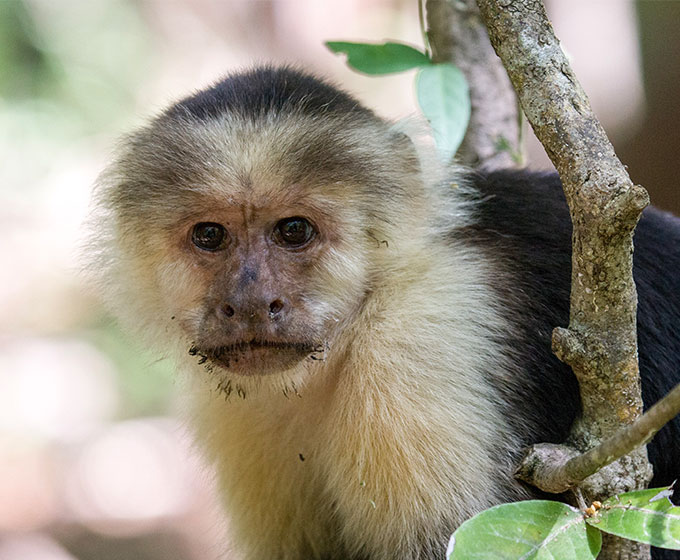
NOVEMBER 14, 2022 — A team of researchers led by faculty from the UTSA College of Liberal and Fine Arts has been selected to receive a five-year, $2.4 million grant from the National Institutes of Health (NIH) to develop a new model that could be used to study biological aging. It is the largest grant COLFA researchers have ever received.
Fernando A. Campos, assistant professor in the UTSA Department of Anthropology, is leading the collaborative research project to understand why some individuals retain good health into old age while others experience declines in their health, physical function and wellbeing.
He and his colleagues believe the answer might lie with wild capuchin monkeys.
“It kind of remains a mystery as to why there’s so much variation in the progression of human aging,” Campos said. “We can gain a lot of insights to the aging processes by studying primates who share a lot of similarity with humans in terms of how their bodies work and things that influence their health such as social and physical environments.”
Campos and his team of researchers are monitoring several groups of capuchin monkeys in a study site called Santa Rosa within the Área de Conservación Guanacaste in Costa Rica.
Like humans, capuchins have complex social relationships, large brains and can live long lives: up to 30 years in the wild and up to 50 years in captivity. To find answers to his questions, Campos’ research will include a combination of field-based behavioral observation and laboratory analyses of noninvasive biological samples such as urine and feces.
“If we can figure out the biological mechanism that causes those differences in aging to happen—the link between the adverse life experience and accelerated aging—that’s the sort of question I really want to provide an answer to,” Campos said. “I want to produce a better understanding of health disparities related to aging, and what kinds of interventions are possible to improve health.”
In phase one of the study, the researchers will identify and validate biomarkers of aging from non-invasive biological samples. In phase two, they will track those aging and health biomarkers by monitoring the capuchins long-term.
“Aging is something that everybody will have to face, if they’re lucky enough to survive to old age, and with it comes massive challenges for human societies and economies around the world,” Campos said. “My research is motivated by the desire to improve the health and wellbeing of older people and this grant will help us keep the project going years into the future.”
Joining Campos are Eva Wikberg, an assistant professor in the Department of Anthropology, and Yeonjoo Park, an assistant professor in the UTSA Department of Management Science and Statistics. Wikberg is identifying the genetic relationships within the group of capuchin monkeys, and Park is assisting with statistical analysis and research design.
Multidisciplinary researchers from the University of Calgary, Tulane University, New York University, University of Montreal and the University of California Santa Barbara are also members of the project team.
UTSA Today is produced by University Communications and Marketing, the official news source of The University of Texas at San Antonio. Send your feedback to news@utsa.edu. Keep up-to-date on UTSA news by visiting UTSA Today. Connect with UTSA online at Facebook, Twitter, Youtube and Instagram.
Enjoy snacks while connecting with Adobe reps and student ambassadors. Download or log into the Adobe Express app to snag swag and unlock exclusive back-to-school templates. It’s a fun, fast way to get creative and start the school year with bold moves.
Central Plaza, Main CampusCelebrate the merger of UTSA and UT Health San Antonio with a pop-up featuring free t-shirts, exclusive swag, and interactive photo opportunities. Open to all students, faculty and staff. Supplies are limited!
Sombrilla Plaza, Main CampusHuddle Against Hunger is a fundraising competition with Texas State that benefits our Roadrunner Pantry. Donations this week will help UTSA earn additional prize monies provided by RBFCU.
In-Person and VirtualJoin UTSA Libraries for an update on federal public access policies and how the library can assist with compliance.
Virtual EventWe invite you to join us for Birds Up! Downtown, an exciting welcome back event designed to connect students with the different departments at the Downtown Campus. Students will have the opportunity to learn about some of the departments on campus, gain access to different resources, and collect some giveaways!
Bill Miller PlazaThere are many citation managers. Which one is right for you? This workshop will explain what a citation manager is and how it can help you organize your citations, insert citations as you write your paper, and generate your bibliography.
Virtual EventPubMed is an essential database for anyone conducting biomedical or health-related research. This workshop will teach attendees how to effectively navigate this free resource and locate peer-reviewed articles using advanced search features, MeSH subject headings, and Boolean operators.
Virtual EventThe University of Texas at San Antonio is dedicated to the advancement of knowledge through research and discovery, teaching and learning, community engagement and public service. As an institution of access and excellence, UTSA embraces multicultural traditions and serves as a center for intellectual and creative resources as well as a catalyst for socioeconomic development and the commercialization of intellectual property - for Texas, the nation and the world.
To be a premier public research university, providing access to educational excellence and preparing citizen leaders for the global environment.
We encourage an environment of dialogue and discovery, where integrity, excellence, respect, collaboration and innovation are fostered.